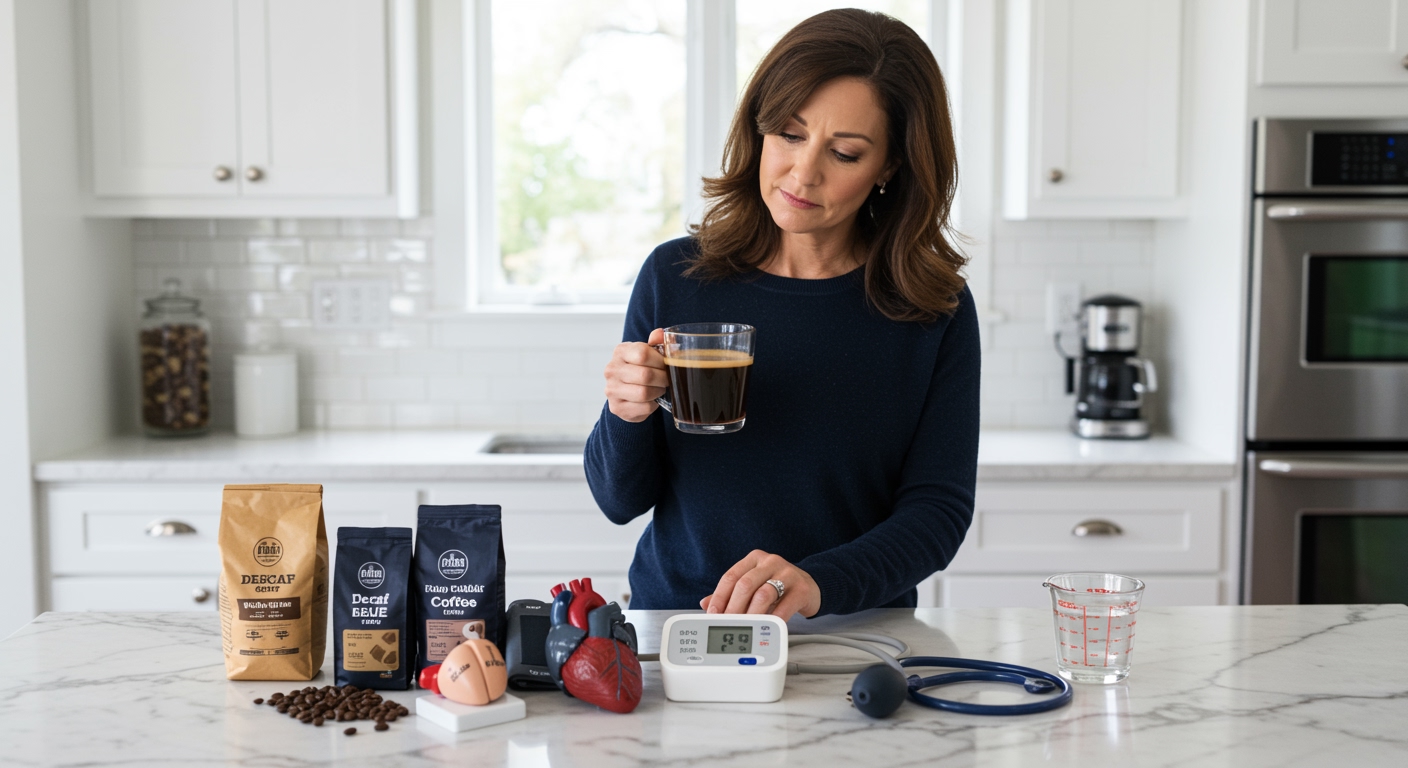✪ Key Takeaway: Decaf coffee can raise blood pressure temporarily due to chlorogenic acids and processing chemicals.
Introduction
Your doctor told you to cut back on caffeine for your blood pressure.
You switched to decaf coffee thinking you solved the problem, but now you wonder if you made the right choice.
Hi, I’m Abdur, your nutrition coach and today I’m going to explain how decaf coffee affects your blood pressure and what you need to know to make the best decision for your heart health.
Does Decaf Coffee Actually Raise Blood Pressure?
Decaf coffee can indeed raise blood pressure in some people, though the effect is usually smaller than regular coffee.
Research shows that decaf coffee contains chlorogenic acids and other compounds that can cause temporary blood pressure increases.
These compounds work by affecting your blood vessels and nervous system in ways similar to caffeine, just to a lesser degree.
The processing methods used to remove caffeine can also leave behind chemicals that impact cardiovascular function.
Studies indicate that people who drink decaf coffee may experience blood pressure increases of 2-5 mmHg systolic and 1-3 mmHg diastolic.
This increase happens because decaf still contains about 97% of the original antioxidants and bioactive compounds found in regular coffee.
✪ Fact: Decaf coffee still contains 2-5mg of caffeine per cup compared to 95mg in regular coffee.
What Compounds In Decaf Coffee Affect Blood Pressure?
The main culprit in decaf coffee is chlorogenic acid, a powerful antioxidant that can constrict blood vessels.
This compound survives the decaffeination process and remains active in your body for several hours after consumption.
Decaf coffee also contains diterpenes like cafestol and kahweol, which can raise cholesterol and indirectly affect blood pressure.
The chemical solvents used in some decaffeination processes can leave residues that may impact cardiovascular function.
These compounds work by triggering your sympathetic nervous system, which controls your fight-or-flight response.
When activated, this system increases heart rate and constricts blood vessels, leading to higher blood pressure readings.
The effect typically peaks within 30-60 minutes of drinking decaf coffee and can last for 2-3 hours.
✪ Pro Tip: Choose water-processed decaf to avoid chemical residues that may affect blood pressure.
How Does Your Body React To Decaf Coffee?
Your body responds to decaf coffee by activating stress hormones like cortisol and adrenaline, though less intensely than with regular coffee.
These hormones cause your heart to pump harder and your blood vessels to narrow, creating the perfect storm for elevated blood pressure.
The adrenal glands release these hormones within minutes of drinking decaf coffee, triggering a cascade of cardiovascular changes.
Your kidneys also respond by temporarily reducing sodium excretion, which can cause fluid retention and higher blood pressure.
Individual responses vary greatly based on genetics, existing health conditions, and tolerance levels built up over time.
People with hypertension often show more pronounced blood pressure increases from decaf coffee than those with normal blood pressure.
✪ Note: Your blood pressure response to decaf coffee may change as you age or develop health conditions.
Should You Avoid Decaf Coffee If You Have High Blood Pressure?
The answer depends on your individual situation and how your body responds to decaf coffee consumption.
If you have well-controlled blood pressure and drink decaf in moderation, the risk is usually minimal.
However, if you have uncontrolled hypertension or are sensitive to blood pressure changes, you should consider eliminating decaf coffee completely.
Monitor your blood pressure before and after drinking decaf coffee to understand your personal response pattern.
Keep a log for two weeks, measuring your blood pressure 30 minutes before and 60 minutes after drinking decaf coffee.
If you notice consistent increases of more than 5 mmHg systolic or 3 mmHg diastolic, consider reducing or eliminating decaf coffee from your diet.
Talk to your healthcare provider about your findings and get personalized advice based on your overall cardiovascular health.
✪ Pro Tip: Limit decaf coffee to one cup per day and drink it in the morning to minimize blood pressure impact.
What Are Better Alternatives To Decaf Coffee?
Herbal teas like chamomile, peppermint, and rooibos provide warm, flavorful alternatives without blood pressure concerns.
These beverages contain no caffeine or chlorogenic acids that could affect your cardiovascular system.
Chicory coffee offers a coffee-like taste and aroma without any compounds that raise blood pressure.
Warm water with lemon provides a morning ritual that actually supports healthy blood pressure through improved hydration.
Green tea contains L-theanine, an amino acid that can help counteract the blood pressure-raising effects of its small caffeine content.
Bone broth offers warmth and comfort while providing minerals that support cardiovascular health.
✪ Fact: Hibiscus tea can actually lower blood pressure by 3-7 mmHg when consumed regularly.
The Bottom Line
Decaf coffee can raise blood pressure due to chlorogenic acids and processing chemicals, making it less heart-friendly than many people believe.
Your morning ritual should support your health, not compromise it, so choose beverages that align with your blood pressure goals.
I would love to hear about your experience with decaf coffee and blood pressure in the comments below, and feel free to share any questions you might have about finding the perfect morning beverage for your health needs.
References
At NutritionCrown, we use quality and credible sources to ensure our content is accurate and trustworthy. Below are the sources referenced in creating this article:
- Harvard Health: Coffee and Your Blood Pressure
- PubMed: Effects of Decaffeinated Coffee on Blood Pressure
- Health Grades: Is Coffee Bad for High Blood Pressure
- PubMed: Coffee Consumption and Blood Pressure Response





